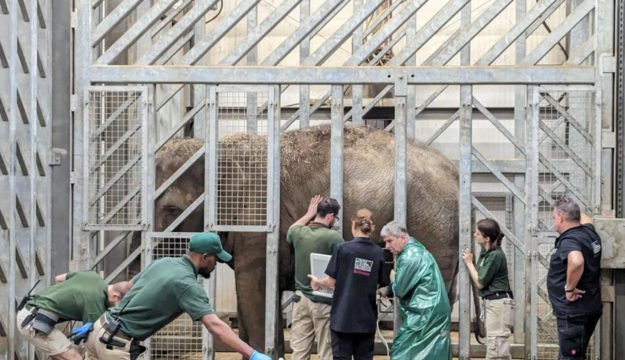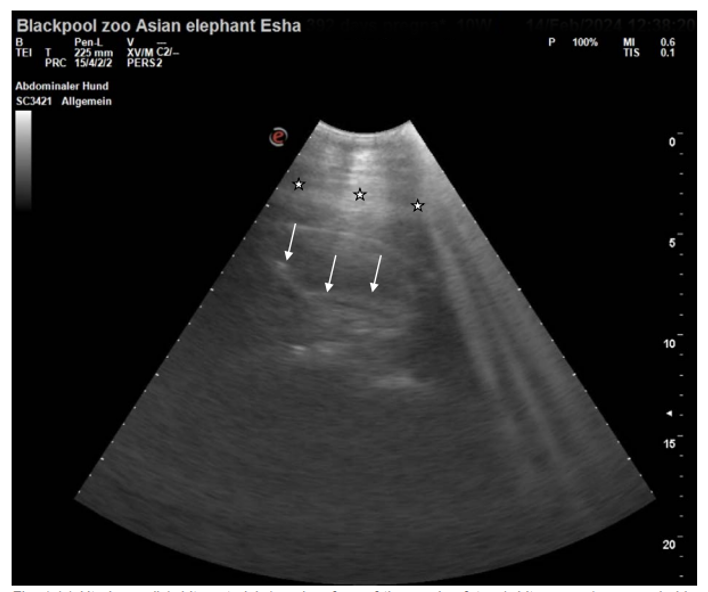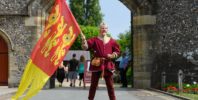 © Blackpool Zoo
© Blackpool Zoo
Two pregnant elephants at Blackpool Zoo have undergone successful ultrasound scans to check the progress of their calves.
Conducted by world-renowned reproductive specialists Prof Dr Thomas Hildebrandt, Dr Frank Goritz, and Dr Susanne Holtze, along with the zoo’s veterinary and elephant keeper teams, the scans showed that both Noorjahan and Esha’s pregnancies are progressing well.
Similar in principle to those performed on humans, the ultrasounds were adapted for the unique anatomy. During the procedure, experts looked for details such as the size, activity levels, location, heartbeat, and condition of the uterus and placenta.
The findings were promising. The calves were active, developed well in healthy uteruses, and were at the expected size for their gestation.
Adam Kenyon, Section Head of the Elephants, is delighted with the calves’ progress. He said: “It was an incredible experience to witness the ultrasound scans, and it was wonderful to welcome the team of experts all the way from Germany.
“Seeing them move on the screen was quite surreal and we got some key information that we needed to confirm the pregnancies are developing as expected.
“The training required with the elephants before these scans can take place is complex and is based on trust, cooperation and a positive environment, so the success of these scans is a testament to the strong relationships our keepers have developed with each individual.
“It is not possible to determine the sex of the calves on the ultrasound scans like it is in humans, but we were able to confirm that they were both around the size of a small dog at the time, which is what we would expect for that stage of pregnancy.
“It was the next significant milestone on our momentous journey to welcome two new babies into our Project Elephant Base Camp facility and one more step closer to having a multi-generational herd.”
“It is both reassuring, and remarkable, to have the ability to use science to give us insights into these young elephants ‘life in the womb’, and gain valuable information in which to develop birthing strategies for the herd.
“Despite there still being a long way still to go and natural inherent risks, we are able to create an environment in which to support successful births within the herd, the rest is down to them”.

© Blackpool Zoo
Asian elephants have been listed as endangered on the IUCN Red List since 1986 and the population is estimated to have declined by at least 50 percent over the last three generations, which means that EEPs serve as a crucial lifeline for ensuring the survival of the species.
Adam continued: “By collaborating, sharing research and exchanging ideas, zoos play a crucial role in the global effort to protect and conserve these highly intelligent and complex animals.
“In addition, studies carried out in zoos can monitor elephant behaviour, physiology and reproductive biology more closely to provide valuable insights that can further inform conservation strategies.”
Project Elephant underpins Blackpool Zoo’s ongoing commitment to the endangered Asian elephant. It focuses on a multi-faceted approach to the continuous long-term management, breeding and welfare needs of the zoo’s elephants, with a special focus on their physiological and psychological well-being. Base Camp, which is Blackpool Zoo’s largest ever single investment, combines the UK’s largest indoor elephant house with several outdoor habitats, all of which were meticulously designed to support the complicated needs of Asian elephants.
Are you looking to plan a group visit to Blackpool Zoo? See www.blackpoolzoo.org.uk for more information.





